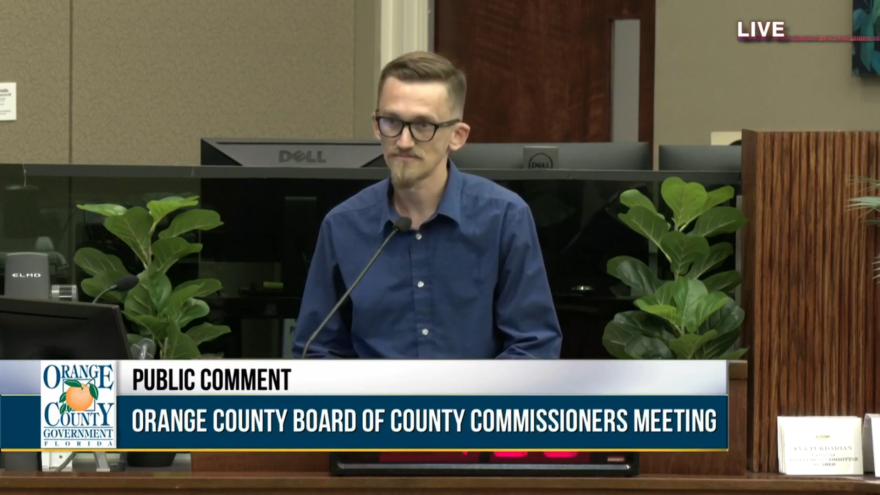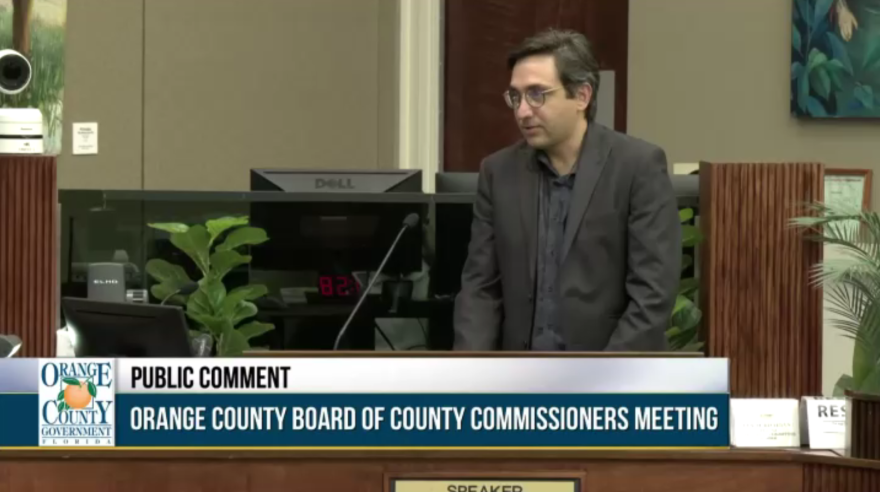In light of a new state law that restricts local governments’ ability to control growth, Orange County commissioners and Mayor Jerry Demings agreed Tuesday to defend the county's new comprehensive plan, land development code and rural boundary protections.
RELATED: Orange County approves long-term development plan Vision 2050 after eight years of work
Alternatively, the board of commissioners could have opted to preemptively repeal one or more of the local ordinances, to avoid possible legal trouble triggered by the new law. Almost 50 people turned out Tuesday to oppose that idea placed before the commissioners for discussion.
Late last month, Orange County received written notice from a law firm challenging the county’s voter-approved rural boundary under the new state law, as well as an amendment commissioners approved earlier this year to remove rural land in Lake Pickett from an area zoned for major development.
But residents Tuesday urged the commission not to bend to such legal threats.

“Draw the line, push back. Orange County is not for sale,” said Avalon Park resident Bradley Hardee.
County staff led a discussion on pros and cons of different potential strategies to address Senate Bill 180’s ramifications during Tuesday afternoon’s roster of public hearings, which stretched into the evening hours, following a packed-full commission agenda earlier in the day.
RELATED: Orange County to renegotiate deal with ICE and its jail

The rural boundary protections county voters approved by 73% in November were years in the making and intentionally crafted to not restrict development, according to several Charter Review Commission members who helped draft the ordinance. CRC member Eugene Stoccardo said he remembers when the county adopted its first comprehensive plan, back in 1991.
“It was good, but we made a lot of improvements,” Stoccardo said. “We've actually streamlined it, made it more simple. It's not burdensome.”
Echoing his own support for the rural boundary, CRC member Angel de la Portilla said he and his colleagues worked “tirelessly” to draft an ordinance that was approved by Republican, Democratic and independent voters.
“This was not an anti-development measure. This is an environmental protection measure,” de la Portilla said.

Some environmental protection efforts currently underway in Orange County likely conflict with Senate Bill 180 and should be paused, according to Deputy County Administrator Jon Weiss. As one example, he pointed to the two new Special Protection Areas the county has been working to propose, for the Shingle Creek and St. Johns River watersheds.
“I think certainly, we have every ability to continue with studies, stakeholder engagement, and even workshop those [SPA] standards,” Weiss said.
But since “Senate Bill 180 seems to preclude the ability to develop and adopt the regulatory aspects,” Weiss said, the county should likely hold off on scheduling a public hearing to actually adopt or implement any new SPA standards.
RELATED: Two sensitive watersheds in Orange County could get special protections

As far as what the new law means for regulations the county has already enacted, like the rural boundary, the outlook is less clear, Weiss said.
It is especially difficult to tell how the law might affect the county’s new comprehensive plan and land use code. Commissioners approved both last month, following nearly ten years of work and tens of thousands of hours of staff time, Weiss said.
“There are no good options with respect to Vision 2050 and Orange Code. We find ourselves in quite the pickle,” Weiss said.
Repealing Vision 2050, or delaying its implementation date, could possibly help the county avoid future lawsuits down the road. But it could also create more confusion and chaos, Weiss said.
“When you adopt a new comprehensive plan, the old comprehensive plan goes away,” Weiss said, citing state law.
Had the county not adopted Vision 2050 by the end of last month, its former comprehensive plan would’ve been found out of compliance with existing state regulations, Weiss said. So now, if the county were to delay or repeal Vision 2050, it would also then need to determine “how to ultimately satisfy and get our 2030 plan back into compliance” with the state.
Meanwhile, the state is still reviewing the contents of Vision 2050 for compliance, Weiss said.
!["I would be incredibly disappointed in the repeal of [Vision 2050] outright," said Orange County Deputy Administrator Jon Weiss.](https://npr.brightspotcdn.com/dims4/default/74b1930/2147483647/strip/true/crop/1612x909+0+0/resize/880x496!/quality/90/?url=http%3A%2F%2Fnpr-brightspot.s3.amazonaws.com%2Ffa%2Fb1%2F3e5f983d4568bf8032429670699f%2Fjon-weiss-oc-bcc-7-15-25.png)
Basically, Weiss said, the county has three options: either preemptively repeal ordinances that might be challenged under the new state law; consider and abide by such challenges as they come in; or, deny challenges like the one the county received last month — an approach that could require the county to defend itself in court.
Ultimately, members of the commission all agreed: if necessary, they’re prepared to fight for Orange County’s home rule power.
District 2 Commissioner Christine Moore, who has at times been criticized as being too lenient with developers, described Senate Bill 180 as overreach.
“This is a little rare for me, but this is really way above and beyond taking away local control. It really is,” Moore said. “Believe it or not,” she said, she supports the county fighting in court if it comes to it.
Although District 3 Commissioner Mayra Uribe didn’t vote with the majority of the board in approving Vision 2050 last month, she said she still stands with the board’s vote — and its right to govern locally.
“If we agree to repeal anything, they're just gonna know that they bullied us, and next year, it'll be even worse,” Uribe said, referring to next year’s legislative session. Her sentiment was met by cheers of “Yes!” from people in the audience.
“Doggone it, if we just keep laying down and letting this happen, what are we gonna stand for?” Uribe said.
Mayor Jerry Demings encouraged Orange County residents not to lose sight of the real fight, which he said is at the state level, in Tallahassee. Senate Bill 180 is an emergency management bill, but in the final days of session, lawmakers added language restricting local home rule.
“This was politics at its best in the nth hour, and we were a casualty, along with some other counties,” Demings said. “The preemption that is going on in Tallahassee is real. We are not alone.”






